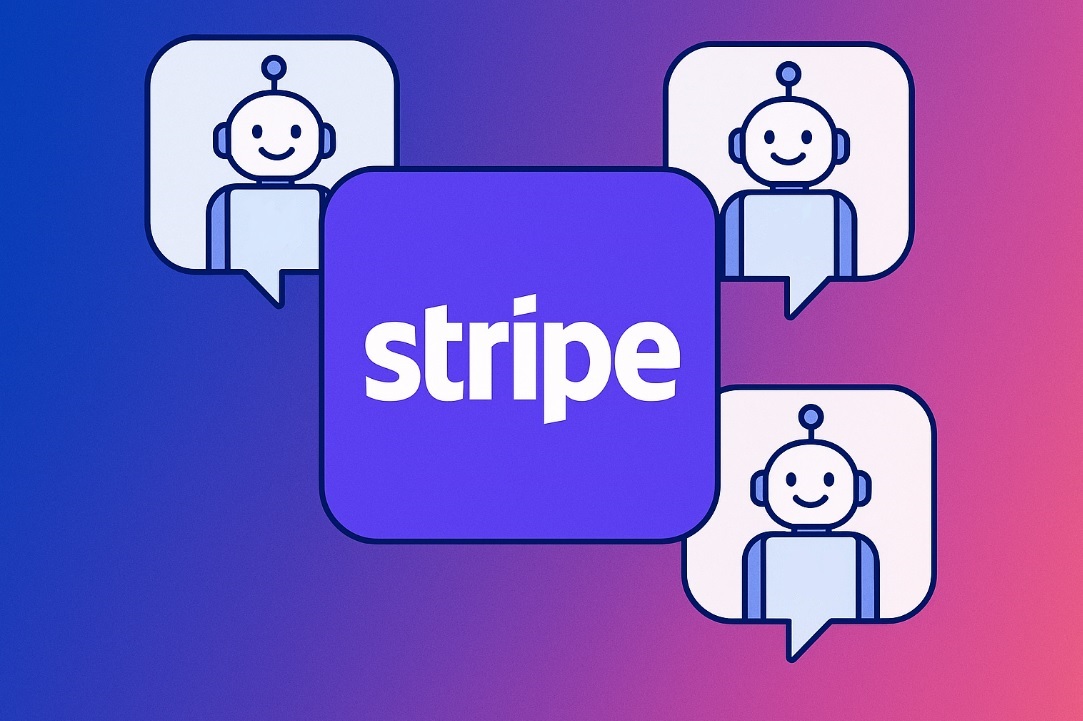According to Stripe, agentic commerce is defined as enabling AI agents “to undertake shopping tasks for customers, including finding products, tailoring recommendations, and completing transactions automatically.”
Stripe sees this as a major shift in how digital commerce will work in the coming years, and they’re acting on it. Through its agentic commerce strategy and the Stripe Agent Toolkit, the company is building the technical foundation for AI agents to act as real buyers.
How does the Agent Toolkit work, and what does it mean for developers, merchants, and the future of AI-driven commerce? That’s what we’ll try to find out.
Stripe Agentic Commerce—How Are They Driving the Change?
Stripe views agentic commerce as the next big evolution in ecommerce. Instead of generative AI just helping users search for products, AI agents should handle entire purchases on their own.
Stripe co-founder John Collison gives a simple example. You instruct your AI agents to buy you a new shit because the one you have is worn out, and the agent finds the same one you bought last time by scanning your old receipts, and reorders it automatically.
To support this future, Stripe is making its platform ready for artificial intelligence. Its APIs are now built to work directly with large language models (LLMs), making it easy for AI agents to handle payment processing.
Recognizing that agents can’t use human credit cards for online payments, Stripe introduced on-demand virtual cards through their Issuing API. These single-use cards come with spending limits and controls, ensuring that any agentic payments an AI agent makes are secure and authorized.
With that said, it’s obvious that Stripe’s goal is to be the financial infrastructure behind these AI-driven purchases, offering secure payments, automated billing, and compliance tools. In fact, the company estimates that 78% of the Forbes 50 AI companies (startups) already use Stripe.
Stripe Agent Toolkit—What Is It and Why Does It Matter?
To make agentic commerce possible, Stripe created the Stripe Agent Toolkit—a developer library that turns Stripe into a set of secure, ready-to-use building blocks that AI agents can access
This toolkit works with common agent frameworks like:
- OpenAI’s Agent SDK
- LangChain
- CrewAI
- Vercel AI SDK
- Model Context Protocol (MCP)
In short, it lets AI agents securely access Stripe’s APIs to create payment links, manage products, set prices, and more. Developers can also combine the Toolkit with Stripe Issuing (for creating virtual payment cards) and Stripe Treasury (for holding and transferring funds) to allow AI agents not only to create payment links but also issue cards or move money automatically when needed.
Beyond basic payments, the Toolkit integrates with Stripe Billing, letting developers automatically charge for things like AI usage. For example, if an agent consumes API resources (like processing prompts and completions), the toolkit can track that usage and pass the costs onto the end user, enabling metered billing models.
How To Set Up Agent Toolkit?
The setup process is straightforward. Developers install the toolkit (available for Python and TypeScript) and configure it with their Stripe account details.
They also define which actions the AI agent is allowed to perform, such as creating a payment link or adding a new product. Once connected, the AI agent recognizes these Stripe functions as available “tools” it can use whenever it needs to complete a task.
How Does Agent Toolkit Work?
When the agent decides to carry out a payment action—whether it’s generating a checkout link or creating a new billing item—it simply makes a structured function call. The Agent Toolkit translates that request into a real Stripe API call and sends back the results in a structured, machine-readable format.
Who Is the Target User for Stripe’s Agentic Solutions?
Stripe’s agentic commerce tools are built for companies that want to let AI agents handle real transactions.
AI Platforms and Agents
One key group is AI platforms and developers building personal AI agents, like travel assistants or shopping bots. These agents can search for products or services, recommend the best options, and complete purchases without or with minimal human intervention.
Saas and Marketplaces
Another major area is SaaS and marketplace businesses, especially those using subscriptions or usage-based pricing. Stripe powers payments for companies like OpenAI, supporting both recurring plans (such as ChatGPT Plus) and pay-as-you-go AI services.
With the Agent Toolkit, platforms can let their own customers’ AI agents handle payments directly—whether that means automatically paying invoices, upgrading to premium features, or managing billing based on API usage.
Retail and Commerce
For retailers and ecommerce brands, agentic trade can be considered a new sales channel. But to reach AI agents, merchants need to make their product catalogs and checkout flows easy for machines to navigate.
Stripe advises businesses to expose product data through APIs and build checkout flows that work for agents, such as embedded purchase widgets instead of redirect links.
Once that’s in place, an AI-powered shopping assistant could search a retailer’s inventory, recommend a product, and complete the payment on the shopper’s behalf using Stripe AI.
B2B and Enterprise
In B2B and enterprise settings, agentic commerce can automate everyday procurement tasks. Imagine a Stripe AI agent that monitors office supply levels and automatically reorders items when stock runs low.
Stripe supports these use cases through features like virtual cards for businesses, with the ability to issue single-use or department-specific cards.
Companies can also use Stripe Connect, Issuing, and Treasury to fund accounts and process automated payments for expense management, procurement, or supplier payments.
What Other Agentic Commerce Products Can Brands Utilize Today?
Apart from Stripe, other companies have also launched their agentic AI commerce solutions.
Visa Intelligent Commerce
Visa Intelligent Commerce helps AI agents securely initiate purchases, authenticate users, and complete payments. It provides APIs and data models that let agents transact on behalf of consumers or businesses across Visa’s global network.
PayPal Agent Toolkit
PayPal’s Agent Toolkit allows AI agents to access PayPal wallets, initiate payments, send online invoices, and manage transactions directly. It integrates into agent frameworks, enabling commerce through PayPal’s financial network.
Mastercard Agent Pay
Mastercard Agent Pay provides AI agents with a secure virtual credit card, payment authentication, and transaction authorization. It enables autonomous shopping, subscription payments, and automated B2B purchases through Mastercard’s global payment rails.
Kibo Agentic Commerce
Kibo’s agentic commerce platform lets brands build AI-friendly storefronts, with APIs for product discovery, personalization, and seamless checkout. It enables agent-driven shopping journeys including search, recommendations, and transactions.




